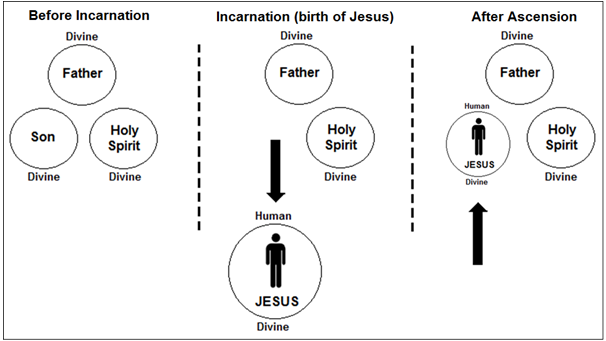In a well written article concerning the Trinity, the comments were divided between being respectful, antagonistic and divisive. I was waiting for someone to point out that the concept of the Trinity was debated by our founding fathers:
Faith of the Founders #8: Jefferson, the Trinity, Faith, and the Occult
In a letter to his fellow revolutionary and former President, John Adams, dated August 22, 1813, Thomas Jefferson made clear that he rejected the Trinity, and the Christian concept of Faith, and thereby the very idea of revelation itself.
The historical background of Jefferson’s letter is the Council of Nicaea in AD 325, which, in laymen’s terms, defined that Jesus Christ was the Son of God from all eternity. This was done to refute a new heresy called Arianism, named after the Egyptian priest, Arius, who taught that Jesus Christ was not the Son from all eternity, but had been endowed with “divinity” at a point after his creation. In other words, he had become the Son of God. He was not the Son of God by nature. Arius’ teaching thus contradicted the Christian belief in the Trinity—that there is one God in three Persons from all eternity: Father, Son, and Holy Spirit.
More…
~~~~~~~~~~~~~~~~~~~~~~
While I encourage you to read the entire letter, here is the portion to which the above referenced:
I remember to have heard Dr. Priestley say that if all England would candidly examine themselves, & confess, they would find that Unitarianism was really the religion of all: and I observe a bill is now depending in parliament for the relief of Anti-Trinitarians. it is too late in the day for men of sincerity to pretend they believe in the Platonic mysticisms that three are one, & one is three; & yet the one is not three, and the three are not one: to divide mankind by a single letter into ὁμοουςιans, and ὁμοιουςιans. but this constitutes the craft, the power and the profit of the priests. sweep away their gossamer fabrics of factitious religion, and they would catch no more flies. we should all then, like the quakers, live without an order of priests, moralise for ourselves, follow the oracle of conscience, and say nothing about what no man can understand, nor therefore believe; for I suppose belief to be the assent of the mind to an intelligible proposition.
~~~~~~~~~~~~~~~~~~~~~~
It is easy to pick verses from the Bible to provide “evidence” of your viewpoint. I wonder how many people actually read Malachi’s article and did more research on the Trinity? How many people thought about why asking a question would have the consequences that resulted in the termination of his ordination?
Here is another article to consider:
Ten Ways the Bible Disproves the Trinity
1. God does not change.
A key element of the Trinity is the incarnation. This teaches that the second person of the Trinity, God the Son, took on human flesh in the bodily form of Jesus. Thus when Mary gave birth to Jesus, God entered into the creation as a human being:
However such beliefs contradict what the Bible teaches about God’s nature:
Your throne is established from of old; you are from everlasting. [Psalm 93:2]
Every good and perfect gift is from above, coming down from the Father of the heavenly lights, who does not change like shifting shadows. [James 1:17]
The Bible defines God’s nature as eternal and unchanging; indeed, God cannot change, because He transcends time. So the claim that God became flesh is a contradiction.
Trinitarians try to get around this problem by arguing that when God became man, a human nature was merely added to God’s existing divine nature. Since the two natures did not mix, the divine nature did not change at all and so God remained the same.
Can this be considered valid reasoning? Well, if God ‘added’ a new nature to Himself, then that is a change in state. Was God always a man? He was not. Did God become a man? According to Trinitarians, he did. So to claim that God did not change is nothing more than philosophical wordplay.
To illustrate this, let’s take the example of a man called John. Consider a situation where God grants John a divine nature. Even if John’s original nature, humanity, remains unchanged and separate from his divinity, would you ever conclude that John has not changed at all?
Would any reasonable person argue, “well, John hasn’t really changed in nature, his original finite human nature is only being complemented by an additional infinite nature”. To claim that John, going from mere mortal to master of the universe, has undergone no change would be absurd.
Clearly, John has changed from one state, not being God, to another, being God. This mirrors the Trinitarian claim that God became flesh, which also entails a change from one state, not being human, to another, being human. The end result for Jesus and John is the same; they’ve both become God-men.
We must conclude that the doctrine of the Trinity involves a change in the nature of God. This directly contradicts the Bible’s statements that God is eternal and unchanging.
More…
~~~~~~~~~~~~~~~~~~~~~~
This article’s purpose is to show that the Trinity is a controversial subject. So controversial that many people will not discuss or debate it. What do I believe? Or I should say what I know:
The topic of the Trinity is a good example of how Men of God should get together and discuss the Bible. In that discussion, I would ask why churches have a difficult time defining the Holy Spirit. Most churches today concentrate on the New Testament and Jesus. I believe the entire Bible is the Word of God. I believe the Lord wants us to debate the Word so that we can temper and refine our faith. I believe that task cannot be completed in a lifetime: the point is to always question, debate and grow spiritually.
David DeGerolamo


















